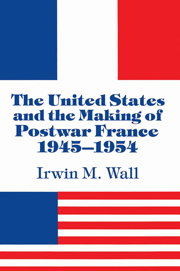Book contents
- Frontmatter
- Contents
- Acknowledgments
- List of abbreviations
- Introduction
- 1 The diplomatic heritage
- 2 The postwar years: Independence compromised
- 3 L'année terrible
- 4 Americanizing the French
- 5 Building an alliance
- 6 The Marshall Plan
- 7 Military aid and French independence
- 8 The United States and French Indochina
- 9 France declares its independence
- Conclusion
- Bibliography
- Index
7 - Military aid and French independence
Published online by Cambridge University Press: 04 December 2009
- Frontmatter
- Contents
- Acknowledgments
- List of abbreviations
- Introduction
- 1 The diplomatic heritage
- 2 The postwar years: Independence compromised
- 3 L'année terrible
- 4 Americanizing the French
- 5 Building an alliance
- 6 The Marshall Plan
- 7 Military aid and French independence
- 8 The United States and French Indochina
- 9 France declares its independence
- Conclusion
- Bibliography
- Index
Summary
THE UNITED STATES, THE SCHUMAN AND PLEVEN PLANS, AND THE FRENCH MILITARY BUDGET
Between 1950 and 1952 French–American relations were once again transformed as the major concern of Paris and Washington shifted from French economic recovery to military preparedness. The Marshall Plan was only in its third year when it was eclipsed by the Mutual Defense and Assistance Pact (MDAP), under the terms of which “end items” of American military equipment began pouring into France in unprecedented and staggering amounts, dwarfing in dollar value the remaining grants and counterpart funds in the province of the Economic Cooperation Administration. France was a major recipient of Marshall Plan aid, accounting for about 21 percent of the total dollar aid disbursed; it was the single largest target of MDAP, which could as easily have been named the French Military Assistance Program. France accounted for more than 50 percent of the military equipment distributed among the Europeans, receiving about $500 million in military hardware in 1950 and like amounts in the two successive years. There was logic in this largesse. The defense of Western Europe depended upon American strategic bombing, the Royal Navy's control of the seas, and European ground troops, the vast majority of which, until the question of a German contribution could be broached, would have to be French. Paris rejected the role of provider of infantry, however, and struggled to reestablish itself as a major military power on land and sea, and in the air.
- Type
- Chapter
- Information
- The United States and the Making of Postwar France, 1945–1954 , pp. 188 - 232Publisher: Cambridge University PressPrint publication year: 1991

